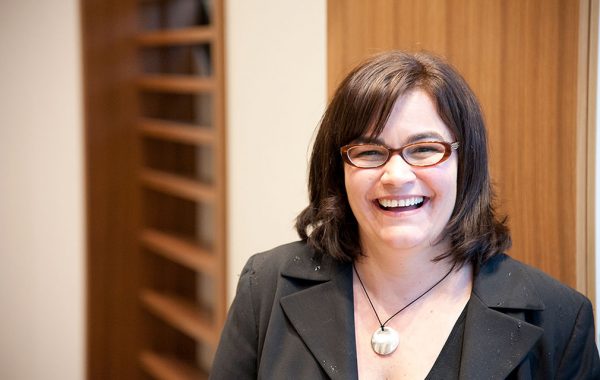Having dedicated her research to analyzing the Hollywood casting couch, Kathy Feeley ’90 wasn’t surprised when the Harvey Weinstein scandal broke. A University of Redlands history professor who specializes in media studies and gender and sexuality studies, Feeley has long been contributing to the conversation about the power dynamic in Hollywood and beyond.
Media and entertainment are a continuous thread throughout Feeley’s life. Growing up in Utica, N.Y., she devoured her grandmother’s gossip rags after church on Sundays and, as a child of the ’70s and ’80s, was glued to the TV. At Colgate, she wrote for the Colgate News (and still has her sweatshirt that brags “Up all night to make your day”), reviewing university theater and movies on the big screen. Feeley double majored in history and women’s studies. She wrote her honors thesis on the history of vaudeville in Utica and how movie theaters led to its decline. After graduation, Feeley was an editorial assistant at Penguin Random House and then earned her PhD at the CUNY Graduate Center before heading to the West Coast.
Now, just an hour and a half from Los Angeles, she’s been a Redlands professor since 2004, and her forthcoming, second book is titled The Mightiest Publicity Powers on Earth: The Rise of the Hollywood Press Corps in Mid-Twentieth-Century America.
As the #MeToo and Time’s Up movements continue to have an influence, the Scene asked Feeley her thoughts on how the system should and can change.
What do you think is missing in the conversation about the #MeToo movement?
The historical piece often gets lost. People are in the present moment and aren’t fully paying attention to the long history of this behavior. It’s deep and systemic.
How would you respond to those concerned about false accusations?
Some are worried about [people not considering the] spectrum of behavior. But that spectrum of behavior is, in fact, a problem. The whole spectrum needs to be readjusted.
Is change in Hollywood possible?
I think the only way it’s going happen in the film industry is to get women producing more, directing more, and working as agents. Representation is really important, because that’s the way to stop the behavior. We aren’t going to eliminate men from the entertainment industry, nor am I suggesting we should. But until men change their code of conduct and their expectations about how to behave in a workplace, how to behave on a date, all of these things, we’re not going to get anywhere.
How optimistic are you?
I feel hopeful. The whole red carpet for the Golden Globes was historic in Hollywood, with Debra Messing talking about intersectional feminism and calling out E! for its pay disparity. Time’s Up is not just about Hollywood but, in fact, it’s about taking what’s started in the film industry and spreading it. It’s really exciting.
— Aleta Mayne







